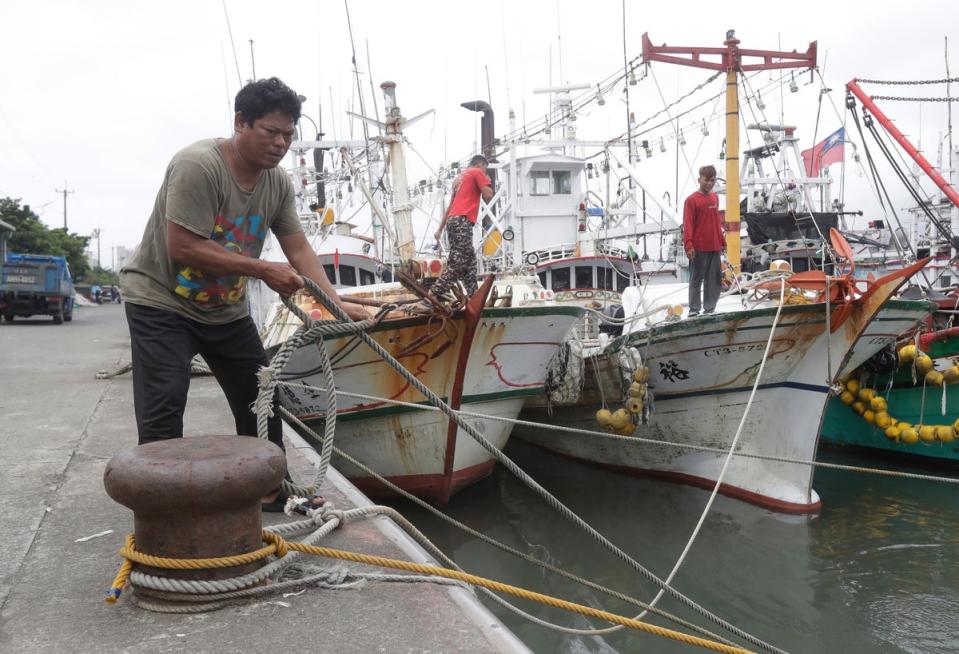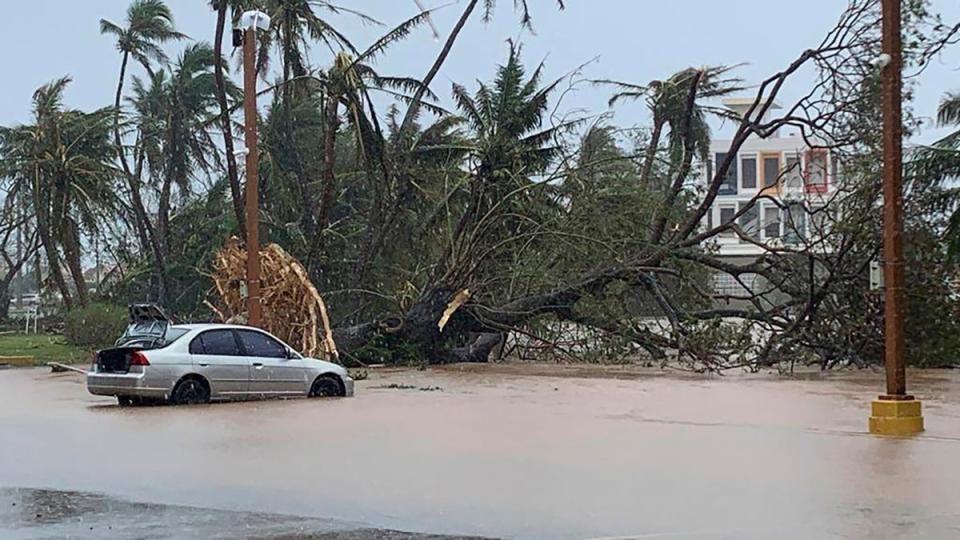Freak May typhoon shows Philippines is now in constant state of climate emergency, activists say
Typhoon Mawar, an unusually intense cyclone that has struck Guam and the Philippines before heading towards Taiwan and southern Japan, shows the southeast Asian country is in a “constant state of climate emergency”, activists have said, demanding reparations for vulnerable nations.
In a statement released on Monday, Greenpeace International demanded fossil fuel companies take responsibility for the intensifying extreme weather events seen worldwide and pay reparations for climate impacts.
The typhoon left Guam flooded and without power for days and has prompted evacuations and amid extreme weather warnings in the Philippines.
Mawar, known locally in the Philippines as typhoon Betty, is the strongest typhoon of the year so far and the strongest northern hemisphere cyclone ever recorded in the month of May.
“The Philippines is in a constant state of climate emergency,” said Greenpeace Philippines campaigner Jefferson Chua.
“Super typhoons have become our new normal, alongside longer-term impacts such as drought, sea-level rise, and resource depletion.”
The Philippines, considered the most exposed country to tropical cyclones in the world, already faces an average of 20 storms annually.
And while cyclones are a naturally occurring phenomenon with their formation and intensity depending on a complex mix of weather patterns, there’s increasing scientific evidence that rapidly heating ocean waters due to the human-induced climate crisis is leading to more frequent and intense typhoons.
Mawar, which weakened for a spell as it lashed Guam on Wednesday, reintensified into a super typhoon – equivalent to a category 5 hurricane – and threatened major disruption to parts of the Philippines archipelago that has been devastated by storms repeatedly in recent years.
Over the past six years, the Philippines has witnessed 14 super typhoons. Climate impacts have caused estimated losses and damages of $10bn from 2010 to 2020, according to Philippine officials.
Typhoon Mawar, like all other supertyphoons before it, is a stark warning and a reminder that scientists predict that things will get a lot worse.
Jefferson Chua, Greenpeace Philippines
While the typhoon’s intensity reduced as it inched closer to the country this week, thousands of people in coastal areas were evacuated, schools shut down, flights were halted and tidal warnings were issued.
Villagers in the Batanes islands, the closest inhabited region to the cyclone, were strengthening their houses with the help of government officials ahead of the extreme weather warnings.
“All over the world, communities who are the least responsible and least able to cope are the ones who bear the brunt of the worsening climate crisis,” said Mr Chua.
“They are burdened not only with preparing for escalating impacts, but also dealing with the anxiety of an uncertain future.”

“But even while communities are doing their utmost so that they can ensure their own future, they are rendered disenfranchised because of the willful inaction of those that have the most responsibility to change.
“Typhoon Mawar, like all other supertyphoons before it, is a stark warning and a reminder that scientists predict that things will get a lot worse,” he added.
The organisation said that the government of the Philippines must demand “reparations for losses and damages from fossil fuel companies” citing a study published this month which aimed to quantify the billions of dollars of damage fossil fuel companies are responsible for.
“Fossil fuel companies responsible for most of the carbon emissions that have largely contributed to the climate crisis are still looking to expand their operations, further exacerbating the effects of climate change, even as they rake in huge profits from our people’s suffering,” Mr Chua said.
The research, published in the journal One Earth, stated that the 21 largest oil, gas, and coal companies are expected to cause $5.4 trillion in lost GDP over the 2025-2050 period, or $209bn per year, based on their emissions share from 1988-2022.
1/5. This morning at #TC2, TC member Rosa Perez of The #Philippines🇵🇭 highlighted the urgency of setting up the #LossAndDamage Fund agreed at #COP27 as #TyphoonMawar approaches the #Philippines. pic.twitter.com/QZZKlHEpI7
— Loss and Damage Collaboration (L&DC) (@LossandDamage) May 26, 2023
The study emphasised that these companies bear substantial responsibility for the costs associated with climate harm.
“The world shouldn’t let these climate crimes continue; culprits must be held to account and must pay reparations,” Mr Chua said.
Meanwhile, Guam, a remote US territory in the Pacific that serves the strategic interests of the country in the region, is still accounting for the damages it underwent when Mawar through.

Island states and territories in the region are experiencing threats from multiple fronts as global temperatures rise, including sea level rise, increasing frequency and intensity of droughts and storms, ocean acidification and consequent damage to coral reefs and fisheries.
Last year at the United Nations’ annual climate conference Cop27, held in Egypt’s Sharm El-Sheikh, countries agreed to set up a loss and damage fund for vulnerable countries like the Philippines and Pacific island nations.
The recent storm is another warning, experts say, of the increasing threats and the urgent requirement for setting up a financing facility.
“Alongside efforts for a fast and fair phase out of fossil fuels, we must ensure support and funds reach communities who are bearing the brunt of these climate disasters,” said Harjeet Singh, head of global political strategy at Climate Action Network International.
“It is a race against time to save lives and livelihoods, and operationalising the Loss and Damage Fund this year is critical to ensure that adequate money reaches those in need."

